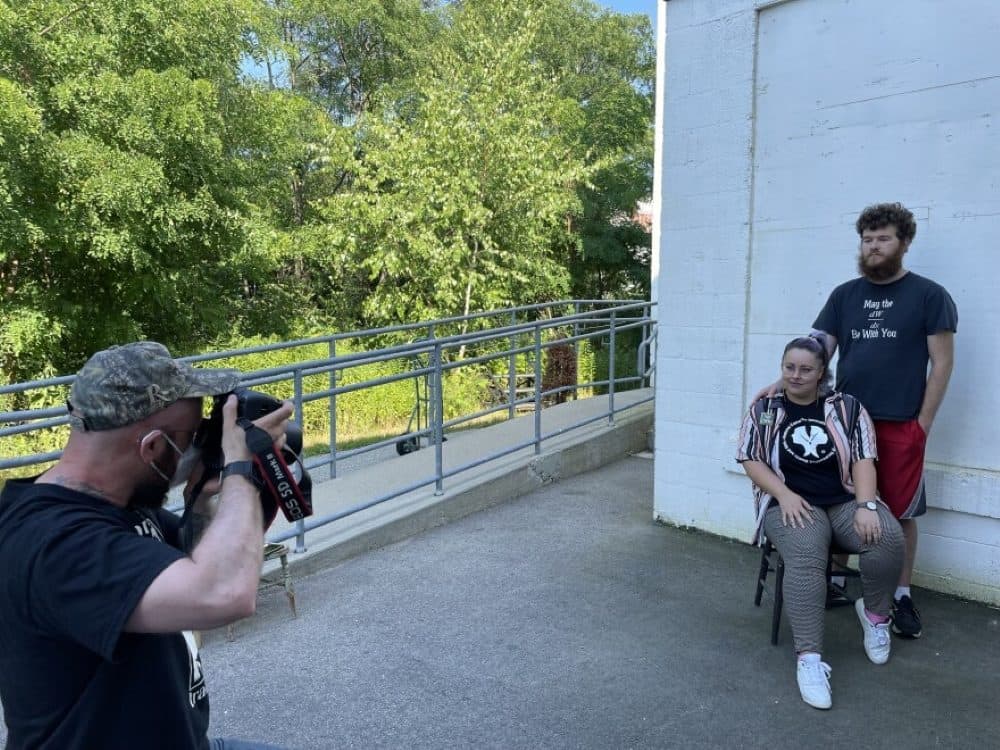Advertisement
Photo project aims to uplift trans, non-binary youth in N.H. and beyond

The first article of clothing Haley Brown, of Rochester, New Hampshire bought that wasn’t gendered for women was a gray watch.
“It doesn't even work anymore, but I still wear it,” they said. On this day, it’s a simple accessory in the portrait they recently sat for at 3S Artspace in Portsmouth.
Brown, who is 23, is one of over 100 young non-binary and trans people who have participated in a photo project called “Are You Ok?” by the Santa Fe-based artist Jesse Freidin. Freidin has spent the past year and a half traveling the country and taking pictures, seeking out queer-friendly spaces to host the photo shoots.
No matter the venue, Freidin sets up each portrait in the same way: A young person sits in a chair, with people who love and support them standing behind them.
One goal of the project, he said, is “to put a face and a name to those who are being directly harmed by the anti-trans laws that are sweeping the nation."
Across the country, state lawmakers have pushed to ban gender-affirming medical care for young trans and non-binary people. Some legislators, including in New Hampshire, have tried to limit participation on sports teams or access to public bathrooms.
The rise of this kind of legislation in Missouri, was a big part of why Brown decided to leave the state last fall. But shortly after they moved to New Hampshire, state legislators here began debating a new policy that would have required schools to report information to parents about their children’s gender identity. The bill ultimately failed. But Brown was shaken by the support this proposal received in the Granite State.
“One of the safest places in the country we thought to move to, that we could afford, is rapidly becoming less that way," Brown said, "and it just kind of feels like there's not really any place left."
At the same time, Brown doesn’t want to sink into despair; it's part of why they chose to be a part of Freidin’s photo project.
“It’s important to me to show that this aspect of young queerness exists,” they said. “And to talk about that and not be quiet.”
Freidin tells his subjects he transitioned years ago to let them know he understands where they're coming from. He said he hopes his photos can be a beacon illuminating the support that does exists for young trans people across the country. Everyone Freidin photographs brings either their biological family or chosen family — other loved ones they've turned to for support — to stand the background of their portrait.
For Brown, that was their husband Derek Berndt. Kai Merrill, a 17-year-old who also sat for a portrait in Portsmouth, New Hampshire, brought his mother Brianna.
Freidin also interviews those who participate in his portrait project. He asks his subjects open-ended questions about the impacts of anti-trans legislation and why they think it might be happening. He wants to give families the space to talk about these policies, and preserve their voices.
One day, he hopes this project will not only appear in art galleries but also as a part of educational programs in schools and medical settings — where people can hear directly from young trans people and their families about the importance of gender-affirming care and support.
For Kai Merrill and Brianna Sargent Merrill, the interview morphed into something else: a conversation between mother and son, about the capacity for change among people who hold deeply anti-trans beliefs.
“Perhaps [Kai is] a little too charitable with the idea that people will change their minds if only they knew someone,” Brianna said. “Because hatred runs really deep.”
Kai nodded. For a moment, he looked like he agreed with his mom. But then, he didn’t.
“I try to have this optimistic view of how people might change,” he said, “because I don't want my activism to ever become hatred of people who might not learn.”
As her son talked, Brianna nodded, quietly beaming and listening.
“I’m so proud of you,” she said.
This story is a production of New England News Collaborative. It was originally published by New Hampshire Public Radio.